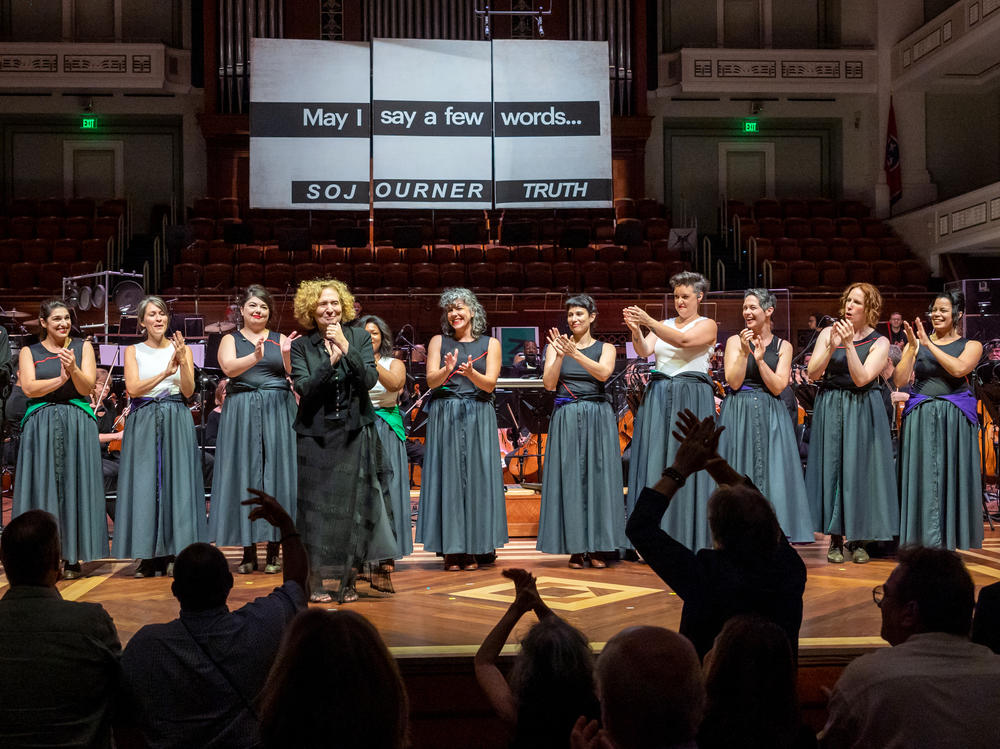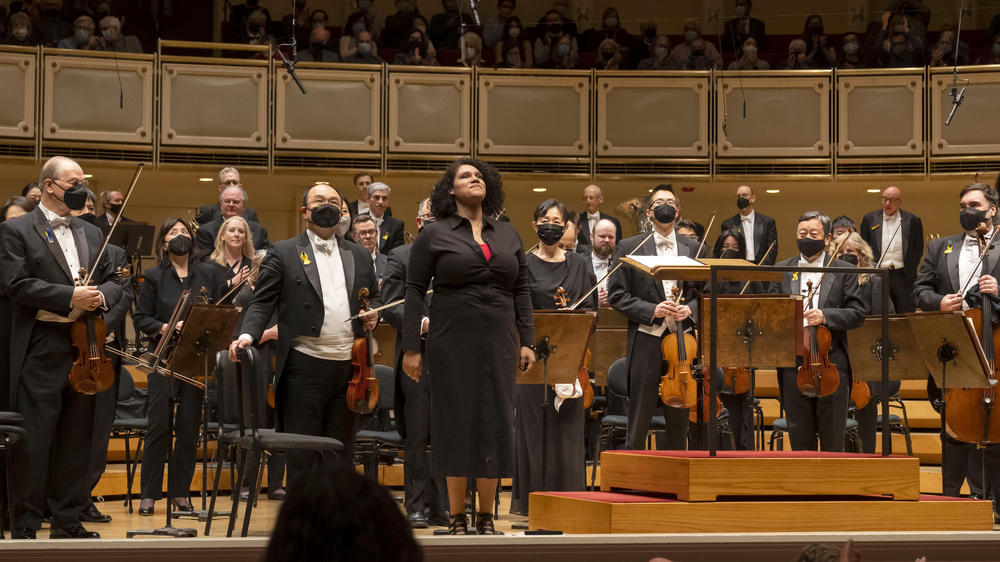Section Branding
Header Content
Our biggest orchestras are finally playing more music by women. What took so long?
Primary Content
"Zero is a very damning number." That was the contrite admission Jeremy Rothman, chief programming officer of the Philadelphia Orchestra, offered in 2018 when confronted with a stark truth: Of the roughly 55 different composers whose work would be performed at regular symphony concerts by his organization in the 2018-19 season, none were women. To be fair, the same was true at the Chicago Symphony Orchestra. The numbers weren't much better for the New York Philharmonic and the Cleveland Orchestra.
Four years later, there's still work to be done — but the tide seems to be turning. More than one in four composers in Philadelphia's current season are women. Among those are three living women receiving world premieres. And there's a showcase for the pioneering early 20th century Black composer Florence Price; the orchestra's recording of her once-forgotten symphonies already earned Philly a Grammy in April.
"Every program we look at is an authentic representation of our community and of our world," Rothman says, reflecting on the current season's offerings. "And that includes gender, sexual orientation, geography, cultures, religions, backgrounds."
Indeed, the sound of symphony orchestras appears to be growing more diverse across the country — even at the top organizations who were programming entire seasons without women just a few years ago. The latest Orchestra Repertoire Report, a statistical overview published by advocacy group the Institute for Composer Diversity, shows a 638% increase in music by women at our symphony halls in the past six years. The numbers for women composers of color — which started at next to nothing — is up a whopping 1425%.
So what happened? Simon Woods, president and CEO of the League of American Orchestras, says that for one thing, the disruptions created by the coronavirus pandemic led to a widespread reevaluation of established cultural institutions. The classical music world was no exception.
"Through the pandemic, we were in this mode of responding very urgently to the situation, which was changing by the month, by the week, sometimes by the day," Woods says. "But that gave us a kind of gift, which is it gave orchestras the opportunity to be able to make changes in response to the change in the spirit of the times. ... And what orchestras have now done, across the country, is they've set the bar higher for thinking differently about who's included, whose voice is heard, whose music is on all stages."
Anne Midgette, former classical critic for The Washington Post, adds that the new level of awareness around inequity in classical performance quickly built into a demand for greater accountability. "The changes that everybody in the orchestra business said, 'This will take years,' all of a sudden accelerated — by the pandemic, but also by the general social discussion and the tenor of the times," Midgette says. "It became clear that you couldn't not do this."
Even composers themselves say they are feeling a shift. "It does seem to be changing," says Jessie Montgomery, whose stirring and darkly textured Hymn for Everyone received its world premiere in April at the Chicago Symphony Orchestra, with Riccardo Muti conducting. "Orchestras and chamber groups and opera companies are embracing composers that they wouldn't have traditionally embraced."
Hymn for Everyone is just one of three major pieces Montgomery was hired to write as the CSO's current composer-in-residence. She also curates their contemporary concert series CSO MusicNow, and was recently named Composer of the Year by Musical America. "Programming is hard," the 40-year-old New Yorker admits. "A lot of it is trying to make sure the audience feels OK, and not surprising them with too much new stuff. There's a lot of that feeling in the presenting world where they're afraid to offend anyone with anything out of the ordinary."
Still, because orchestras are under more scrutiny today, conductors and programmers alike are paying more attention to issues of diversity and inclusion. That's been the case not only at the biggest institutions, but at mid-level orchestras like the Nashville Symphony, which last month played the world premiere of Julia Wolfe's Her Story — an arresting hybrid oratorio inspired by the history of women's rights movements, featuring texts by Sojourner Truth and Abigail Adams. The 63-year-old composer's music will also be heard at the big orchestras in Boston, Chicago and New York this season.
Wolfe says she has routinely battled sexism in her career, but even her experience is better than that of her predecessors, who were often up against a complete lack of opportunities. "I could complain about it, but it's been so much easier for me than, say, the generation before me," Wolfe explains. "I think of people like Joan Tower and Tania León and Meredith Monk. They really had to get the machete out and carve a path. Nobody was really, truly recognizing women composers in that generation."
The shift toward reexamining representation is good news to Wolfe, though she adds that tokenism isn't the same as equality. "You just want to be a composer," she says. "You don't want to be a 'female composer.' You really want to just do your art and say what you have to say."
Midgette, similarly, warns against conflating the integrity of institutions with that of the art, "because the art is doing just fine," she says. "I think that the institution of the orchestra needs a big overhaul. I've been drawing the restaurant parallel: It really is as if we were eating in a bunch of 1970s-era restaurants that hadn't been refurbished."
The Cleveland Orchestra, Midgette notes, has been slower to reimagine itself: Out of the 42 different composers they are presenting this season, only three are women. One of those is Louise Farrenc, the 19th century French composer who has been enjoying some posthumous success lately. This season, her music is also on the menu at the Houston Symphony, the Philadelphia Orchestra and the Atlanta Symphony Orchestra.
"Louise Farrenc writes music that sounds like classical music to somebody whose view of classical music is Beethoven and Brahms," Midgette says. "She fits into that 19th century tonal world, which is what a lot of people want from classical music."
But what people want from their symphony orchestras, specifically, seems to be changing. And it's fair to wonder whether this trend of hearing more works by women and composers of color will last. "I feel like once you've opened that door, you can't close it," Midgette proposes. "Even if for some orchestras it's tokenism, there's a fundamental sort of shift happening. And I hope the future looks much more like the Philadelphia Orchestra season this year and much less like what we've come out of."
As far as Jeremy Rothman is concerned, the shift in Philadelphia is here to stay: "This is not temporal or short lived, but something that is now built into our DNA, into our source code, as an institution going forward," he says.
And throughout the larger landscape, there's a growing business reality that orchestras, no matter what their curators believe, will have to contend with going forward — that attracting larger, younger and more diverse audiences will almost certainly require offering more than the same old, dead, white, male, Eurocentric warhorses at the symphony.
"All the classical art forms are going to have to think about how to come out and meet changing demographics and meet changing society in new ways," Woods explains. "If you don't think that, then you're not paying attention."
(Audio from Jessie Montgomery's Hymn for Everyone, in the radio version of this story, is provided courtesy of the Chicago Symphony Orchestra and Riccardo Muti Music.)
Copyright 2022 NPR. To see more, visit https://www.npr.org.


